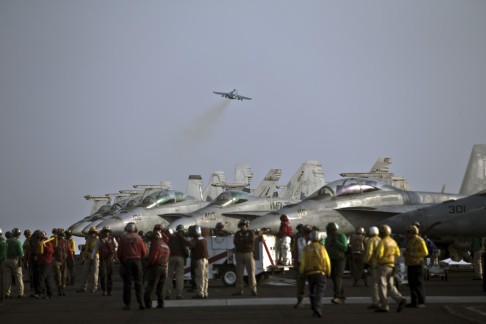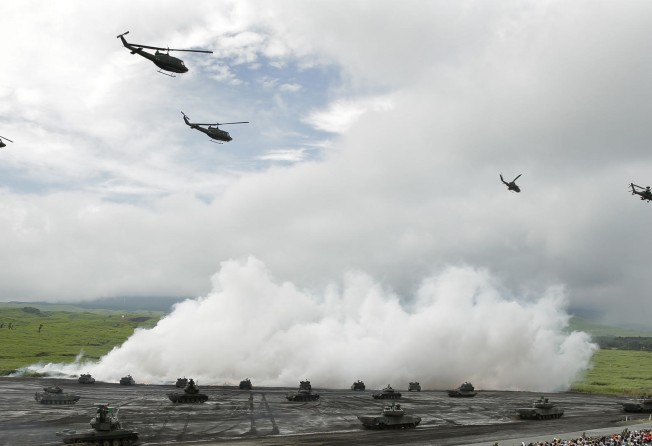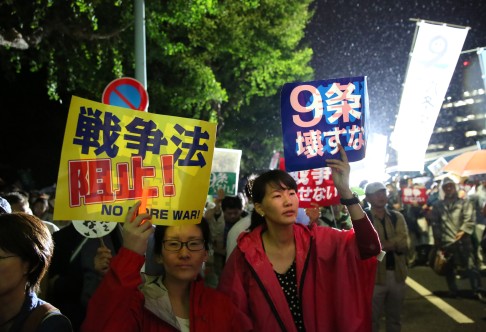
A Japanese offensive: Constitutional changes may result in Tokyo coming under increased pressure from Washington

Japan and ally the United States can start making plans for a possible conflict with China after the expected enactment of defence legislation this week, but Japan will not be sending troops to back up US-led operations against Islamic State (IS).
Those two scenarios show both how far Japan will have come in loosening the constraints of its pacifist constitution on its military and how far it will remain from being a "normal nation", unconstrained in overseas military operations by legal limits and a deeply rooted public anti-war mindset.
Some in Japan worry that the gap between what Japan can or will do and what the United States hopes for could cause friction with Washington if a failure to meet overblown expectations means it becomes disillusioned with its Asian partner.
"With these legal changes, we will be able to do almost everything the United States has asked. There is almost nothing we cannot do when it comes to things like providing ammunition and rearguard support," a Japanese naval officer said.
"But what America really wants is for Japan to fight in the war against terrorism," he added. "If US public opinion rises against Japan, this will be a problem."
Despite public protests and surveys showing a majority of voters object, parliament's upper house is expected as early as this week to enact defence bills Prime Minister Shinzo Abe has called "the first of its kind and a sweeping" reform.
The changes include an end to a decades-old ban on defending a friendly nation under attack, or collective self-defence, when Japan faces a "threat to its survival".
They also expand scope for logistics support for US and other countries' militaries and participation in multinational peacekeeping operations.
The United States has welcomed the shift, while China, where anger over Japan's brutal occupation before and during the second world war is still deep, has said the legislation would "complicate" regional security.
Domestic critics say the changes violate the constitution and open the door to entanglement in US-led conflicts.
The bills, passed by the more powerful lower house in July, have since been debated in the upper house. Abe's ruling party wants to have them approved by tomorrow to avoid a swelling of protests during the upcoming five-day weekend. Abe also has promised the US the bills would pass in parliament by this summer.
Last night, opposition parties had planned actions to try block the legislation, including censure motions to try to embarrass the government into submission, but these were not expected to stop the bill being passed.
Abe has in principle ruled out sending troops to fight in foreign territory and said Japan would not even provide logistical support for US-led operations against IS.
"Japan is not going to be like Australia, the UK or Germany in that those countries have been providing all sorts of human assets to war zones, Afghanistan, Iraq," a Japanese government source said. "That is not going to be a thing that Japan can do."
The changes leave Japan still short of being a "normal nation" by global security standards. Collective self-defence, for example, will only be exercised if three conditions are met including a "threat to Japan's survival".
"It is a big step by Japanese standards but not huge by major power standards," said Narushige Michishita, Japan scholar at the Woodrow Wilson International Centre for Scholars.
That said, closer integration with US forces in particular opens the door not only to expand peace-time patrols and exercises but also to start join planning for conflict.
"It will enhance deterrence and integrate Japan much more closely not just with the United States, but with Australia, the Philippines and other US allies," said Michael Green, Japan chair at the Centre for Strategic and International Studies
"Japan can be integrated in the use of force - not Japan doing offensive missions, but supporting the United States in an emergency that is a threat to Japan's interests and survival."
Michishita said the legislation would allow Japan and the United States to begin planning to defend the "first island chain", an arc of islands enclosing China's coastal waters from the Kuril Islands southward through the Japanese archipelago, Taiwan and the northern Philippines to Borneo.
"From the military operations perspective, this is most important," said Michishita, a former defence official.
Still, some in Japan worry a perception gap with the US over what Japan can or will do could lead to damaging friction.
"There are experts in the United States who have the misconception that Japan will be able to exercise collective self-defence based on international law and equivalent to what the United States can do," said former defence minister Satoshi Morimoto. "Japan is going to have to make a lot of effort in this area [to avoid friction]."
Additional reporting by Kyodo and Associated Press
WHAT IT MEANS
Key points of the legislation, which consists of one new law and revisions to 10 existing laws.
Limited collective self-defence
This allows Japan to exercise its right to collective self-defence by deploying its military to respond to an attack against a friendly foreign country under three conditions: the attack results in a threat to Japan's survival, no other appropriate means are available, and the use of force is limited to the minimum necessary. As examples, Prime Minister Shinzo Abe has cited defending a US ship attacked while transporting Japanese citizens evacuating a conflict zone, or protecting a US destroyer conducting surveillance against a possible missile attack on Japan. Abe has said as a general principle, Japanese troops would not be sent to fight in foreign territory or waters but an exception could be made for minesweeping in the Hormuz Strait if maritime commerce is blocked.
International peace support
A new, permanent law would allow Japan's military, with prior parliamentary approval, to provide logistical support to armed forces of other countries seeking collectively to secure international peace, if a UN resolution has been adopted. This would be limited to areas where conflict is not under way.
Logistical support
Allows Japan to provide logistical support to the United States and other countries engaged in operations in situations with "important influence" on Japan's security. This expands the current scope and clarifies that there are no geographical constraints. Abe has ruled out providing logistics support for US-led operations against Islamic State.
Peacekeeping
In addition to UN peacekeeping operations, allows Japan's military to take part in multilateral peace and security operations outside the UN framework. Allows the military to protect civilians or troops of other countries participating in peacekeeping. Relaxes rules on use of weapons during peacekeeping operations.
Asset protection
Allows Japan's military to protect weapons and other equipment of US and other countries' armed forces when they are engaged in operations contributing to Japan's defence.
Reuters
